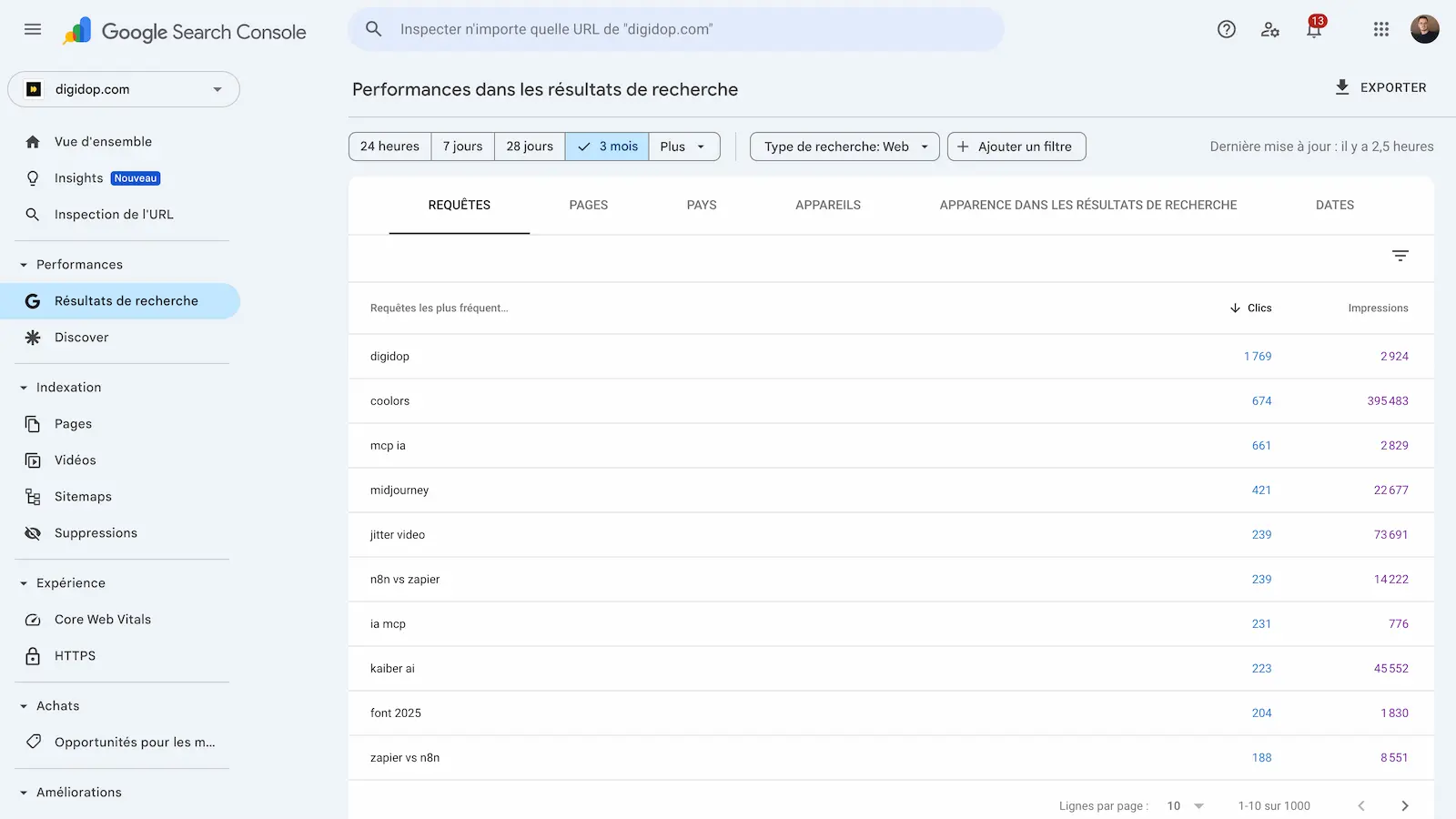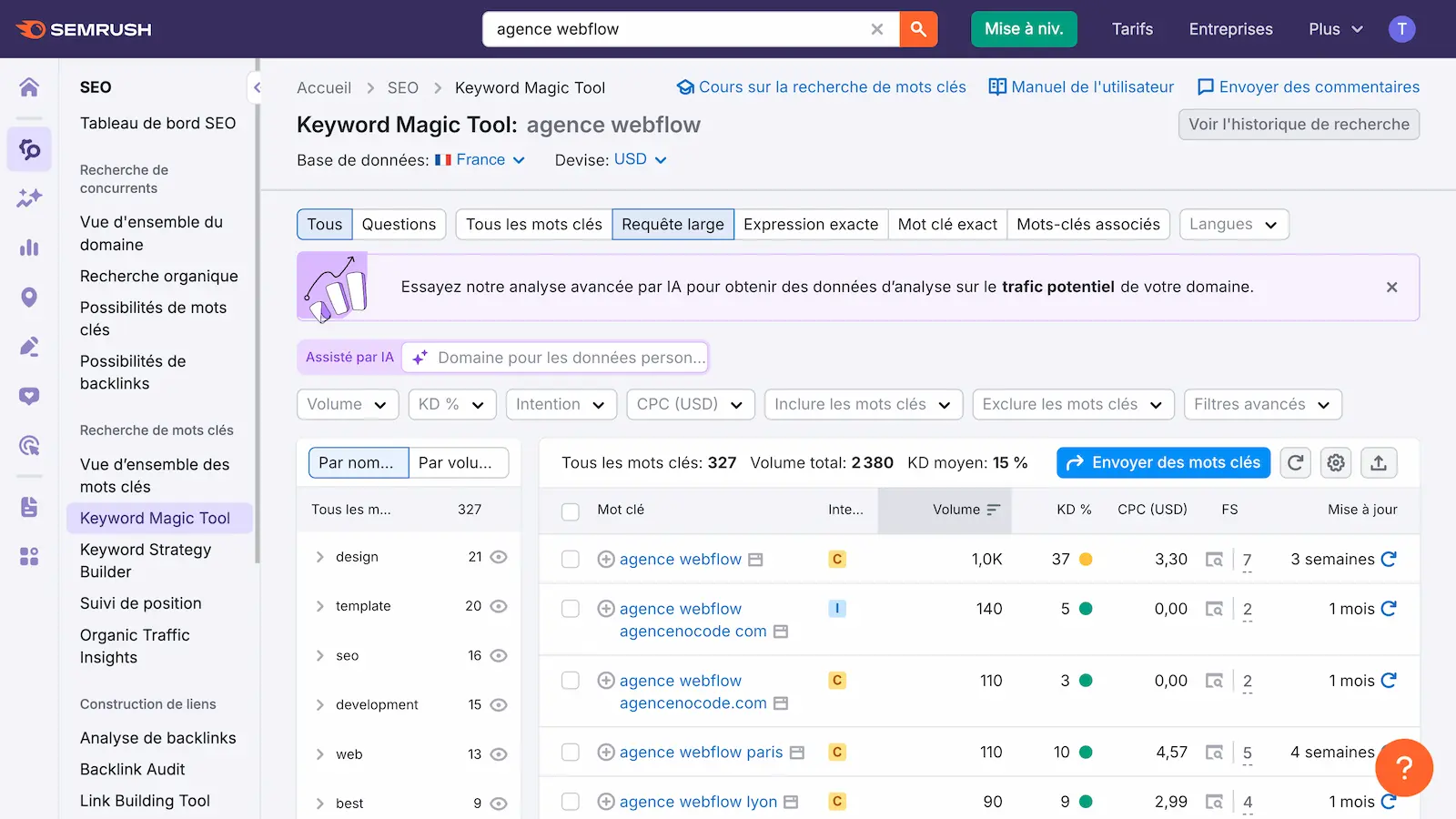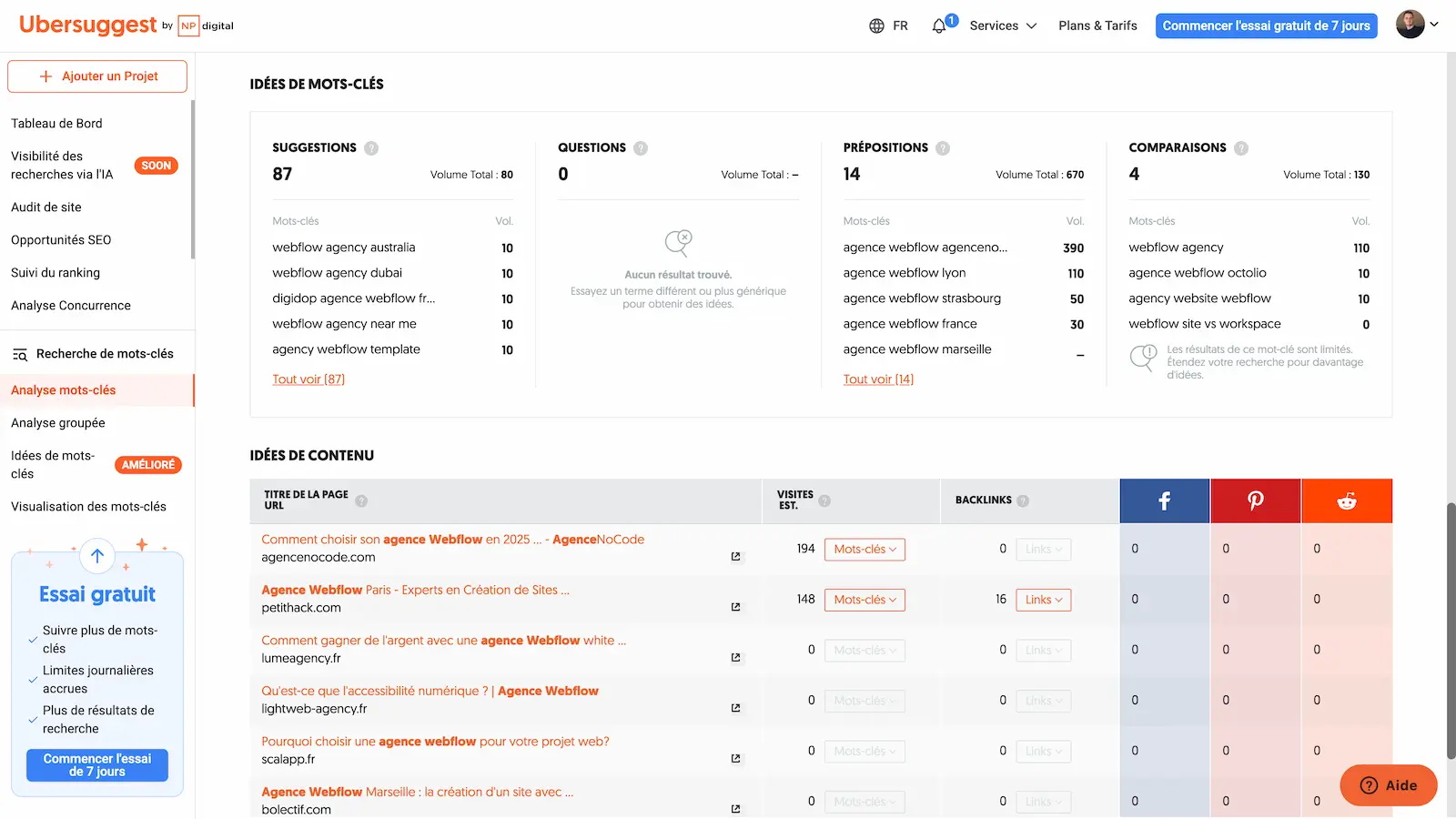The evolution of SEO and keyword research in 2025
Keyword research for SEO is undergoing a major transformation. Artificial intelligence is fundamentally changing our approach to search engine optimization. Traditional tools that only analyzed search volumes are giving way to solutions that understand user intent and semantic context.
This evolution comes with a philosophical shift. Stop thinking about SEO as a keyword battle, and start approaching it as a strategy for useful, structured, and credible content designed to answer real user questions — content that AI can cite. Search engines now prioritize content that precisely addresses user needs rather than content that accumulates keywords without coherence.
Les 12 meilleurs outils de recherche de mots-clés
1. Google Search Console - The essential free tool
Google Search Console remains the reference tool for analyzing your keyword performance. It reveals the terms that generate impressions and clicks on your site, directly from Google's official data.
Strengths: official Google data, opportunity identification, position tracking
Pricing: Free

2. Semrush - The comprehensive professional solution
Semrush dominates the professional SEO tools market with over 25 billion keywords in its database. Its Keyword Magic Tool generates thousands of variations from a single seed keyword.
Strengths: advanced competitor analysis, international data, SEO/PPC integration
Pricing: Starting at $139/month

3. Ahrefs - Excellence in backlink analysis
Ahrefs excels in backlink analysis while offering highly effective keyword research features. Its Keywords Explorer analyzes search intent and ranking difficulty with exceptional accuracy.
Strengths: outstanding backlink database, precise difficulty metrics, comprehensive SERP analysis
Pricing: Starting at $99/month
.webp)
4. Ubersuggest - The accessible Neil Patel creation
Ubersuggest democratizes access to SEO tools with an intuitive interface and affordable pricing. It generates suggestions based on Google Suggest and offers competitor analysis.
Strengths: ease of use, lifetime license available, excellent value for money
Pricing: Free version limited, paid plans from $29/month

5. Google Keyword Planner - The official Google Ads tool
Google Keyword Planner remains a reference for understanding search volumes and estimating cost-per-click. Although designed for paid advertising, it provides valuable data for SEO.
Strengths: official Google data, traffic estimates, free with Google Ads account
Pricing: Free (requires Google Ads account)
6. SE Ranking - Excellent value for money
SE Ranking offers a comprehensive platform at competitive prices. It combines keyword research, position tracking, technical audits, and competitor analysis.
Strengths: clear interface, multi-project management, competitive pricing
Pricing: Starting at $39/month
7. KWFinder - Specialized in long-tail keywords
KWFinder stands out for its ability to identify long-tail keywords with low competition. Its colorful interface makes visual difficulty analysis easy.
Strengths: low-competition niche identification, clear visual interface, beginner-friendly
Pricing: Starting at $29.90/month
8. AnswerThePublic - User questions visualized
AnswerThePublic visualizes user questions as mind maps. It reveals queries starting with "who," "what," "how," "why," providing insights into search intent.
Strengths: user intent understanding, creative visualization, content ideas generation
Pricing: Free version limited, paid plans from $9/month
9. Google Trends - Trend evolution analysis
Google Trends analyzes the temporal evolution of queries and compares the popularity of different terms. It identifies seasonal peaks and emerging trends.
Strengths: historical data, geographical comparisons, trend identification
Pricing: Free
10. Text Optimizer - French semantic optimization
Text Optimizer analyzes the semantics of your content and suggests related keywords to enrich your lexical field. It assigns an optimization score and suggests improvements.
Strengths: advanced semantic analysis, contextual suggestions, French development
Price: $60/month ($45/month with an annual subscription)
11. Keyword Surfer - The handy Chrome extension
Keyword Surfer integrates directly into Google search results via a Chrome extension. It displays search volume and related terms without leaving the SERP.
Strengths: native Google integration, real-time use, contextual data
Price: Free version and paid options
12. Moz Keyword Explorer - Comprehensive keyword analysis
Moz Keyword Explorer provides detailed keyword analysis including search volume, difficulty scores, and competitive analysis. It's designed to help users discover and analyze keywords for SEO and content strategies.
Strengths: accurate difficulty scores, SERP analysis, user-friendly interface
Pricing: Starting at $99/month
AI's impact on keyword research
Artificial intelligence is radically transforming keyword research. New tools use machine learning algorithms to understand semantic nuances and automatically group terms by search intent.
User intent analysis
AI tools now analyze four types of intent:
- Informational: seeking information ("how to make")
- Navigational: accessing a specific site ("Facebook login")
- Transactional: purchase intent ("buy iPhone 15")
- Commercial: comparison before purchase ("best laptop 2025")
Automatic keyword clustering
Solutions like Keyword Insights use AI to automatically group keywords into thematic clusters. This approach allows creating content that comprehensively covers a topic rather than targeting isolated terms.
Advanced semantic understanding
AI-powered tools can now understand context, synonyms, and related concepts, helping identify keyword opportunities that traditional tools might miss. They analyze the semantic relationship between terms and suggest content structures that align with how search engines understand topics.
Content optimization guidance
Modern AI tools don't just provide keywords—they offer actionable recommendations for content structure, suggest questions to address, and even generate content briefs optimized for both search engines and user experience.
How to choose the right tool in 2025
Define your needs
Analyze your objectives:
- Content volume to produce
- Available budget for tools
- Team expertise level
- Geographic markets targeted
- Specific industry requirements
Test free trials
Most tools offer free trials. Use them to:
- Evaluate user interface
- Test data quality
- Check workflow compatibility
- Measure learning curve
Consider the ecosystem
A good tool integrates with your existing workflow:
- Available API connections
- Export options to your usual tools
- Collaboration features
- Responsive technical support
FAQ
Do we still need keyword research in 2025?
Yes, but differently. Keyword research is evolving toward understanding user intent. It's less about identifying isolated terms and more about understanding real user needs to create relevant, structured content that serves both users and search engines.
What budget should I plan for a professional keyword tool?
Between $30 and $150 per month depending on your needs. SE Ranking offers excellent value at $39/month, while Semrush at $139/month suits agencies with advanced requirements. Google Search Console remains free and essential.
Will AI replace traditional tools?
AI complements rather than replaces traditional tools. It brings more advanced semantic analysis and better intent understanding, but search volume data and competitor analysis remain essential for comprehensive keyword strategy.
How do I identify high-potential keywords?
Look for terms with decent search volume (over 100 searches/month), moderate difficulty (score under 60), and clear intent aligned with your business goals. Long-tail keywords often offer the best opportunity-to-difficulty ratio.
Are free tools enough to get started?
For beginners, yes. Google Search Console, Google Keyword Planner, AnswerThePublic (free version), and Ubersuggest provide a solid foundation. Upgrade to paid solutions when your needs become more complex or you manage multiple projects.
Toward a more strategic SEO approach
The future of keyword research is shaped around three major axes: deep understanding of user intent, advanced semantic analysis, and artificial intelligence integration. SEO professionals must adapt their methods to create content that truly meets user expectations.
This transformation brings a more holistic approach to search engine optimization. Rather than focusing solely on isolated keywords, it's important to develop genuine topical expertise, structure information logically, and maintain semantic consistency across the entire website.
The challenge for 2025 will be to intelligently combine data from traditional tools with AI-powered analysis capabilities, while keeping in mind that SEO success ultimately depends on creating value for the end user.
To rank first for your target queries, we encourage you to read our article on how to optimize the SEO of your Webflow site!


.webp)




